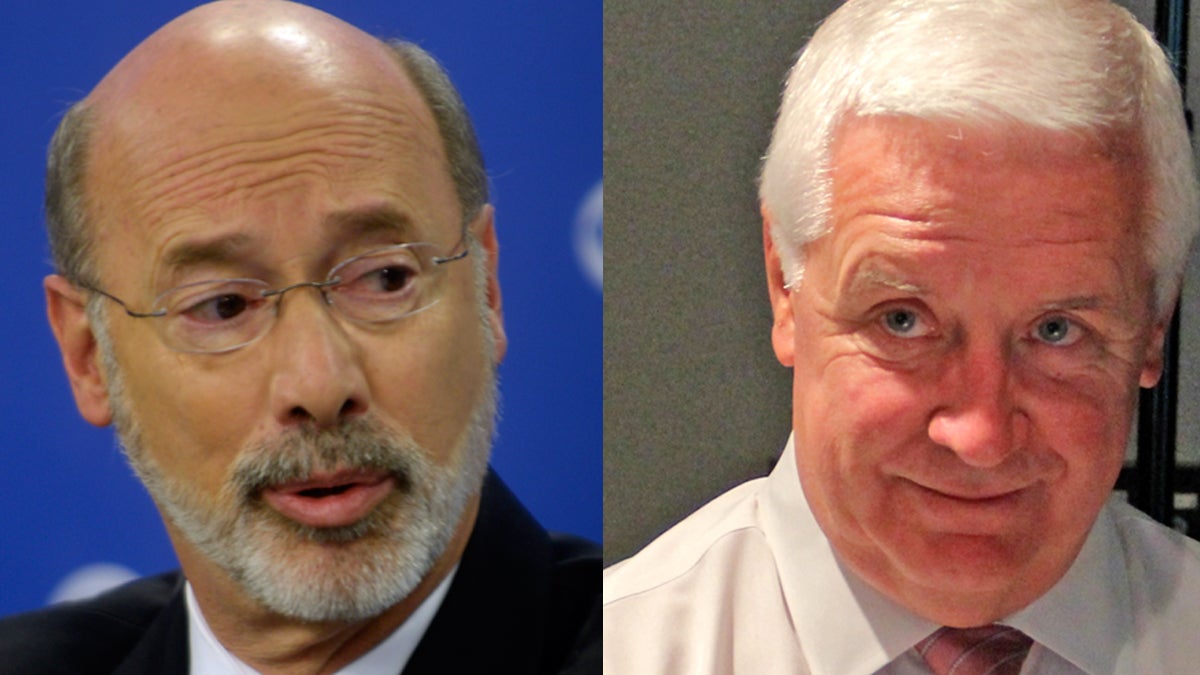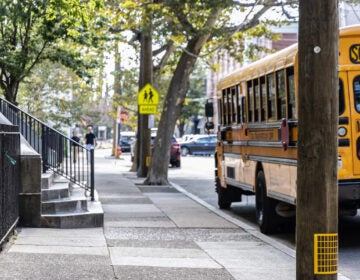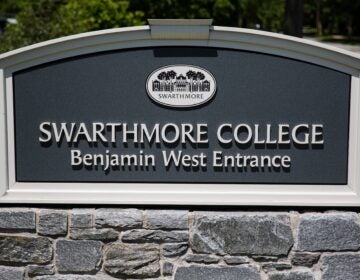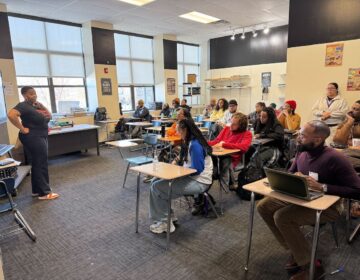Election 2014: A look at Corbett and Wolf on education
Listen
Tom Wolf (left) and Gov. Tom Corbett (Tom Gralish, The Philadelphia Inquirer/AP Photo Pool and Emma Lee/WHYY)
OK, let’s get right to the looming question: Did Tom Corbett cut a billion dollars from public, K-12 education?
That question can be answered in different ways. It all depends on what you count, and how you count it.
If you say “yes,” Corbett did cut the money, here’s how your logic goes: as put together by Democrat Tom Wolf.
The Wolf case vs. Corbett
First, you note that actual classroom spending decreased because Corbett didn’t replace the federal stimulus funds that former Gov. Ed Rendell used to prop up schools through the early years of the Great Recession. You point out that, by contrast, he made up for the stimulus funds lost by the departments of Corrections and Public Welfare.
“Education was a conscious cut, was a conscious redirection of priorities. I would not have had those same priorities,” Wolf said at a teachers’ union event in August.
If you’re making the anti-Corbett case, you insist he should have been more creative in where he found cash for education.
“Decriminalizing marijuana, legalizing medical marijuana,” Wolf said in August, “those things alone would stop a big chunk of the flow, immediately, of the people into our prisons, and reduce the need to spend hundreds of millions of dollars each year on new prisons.”
Corbett also cut the extra money Rendell had been sending to districts to defray the costs of charter schools. This hurt urban districts like Philadelphia, Reading and York especially.
“There are good charter schools,” said Wolf, “but I think we need to make sure the funding for charter schools is fair.”
If you’re anti-Corbett, you also don’t count any of the money he has poured into the state employee pension system, which is the lifeblood of the state’s retired teachers.
Your argument for ignoring that effort on his part is that voters should look mostly at class-sizes, classroom resources, and local property taxes. In the last four years, each has gone in the wrong direction.
The Corbett case for his record
If, on the other hand, you say ‘no,’ the billion dollar cut line is baloney, here’s how you do your math, as explained by none other that Gov. Corbett himself.
Rendell should have never used federal stimulus funding to prop up education, Corbett says. Everyone knew it was merely intended to be a shot in the arm – not something to count on for years to come.
“Because that’s when the cut took place,” Corbett said at the second of three gubernatorial debates. “You cannot deny that.”
To really replace the stimulus money, he says, would have required draining other important parts of the state budget.
“I had a choice of going back and taking money out of the areas that state money was moved to from the budget and putting it back in, and chose not to,” said Corbett at a recent interview at WHYY. “So yes, that was a choice.”
The other option would have been steep tax increases, which Corbett says would have crippled the state’s economic recovery. Instead, Corbett says he counted on school districts themselves to rein in spending.
“We look to the school districts to control their spending. ‘Cause it’s there. They’re the ones that make the decision how much they’re going to spend,” he said at the WHYY interview.
Pensions a bone of contention
Pension costs, the pro-Corbett camps says, are an important part of the equation and can’t be ignored. They’ve dramatically risen over the past few years, and are a big reason school districts are hard-pressed to maintain classroom spending. For the state to delay its share of pension payments would do school districts no favors, while putting the pension fund on a shaky path for years to come.
“My predecessor reduced the payments to pensions. He took state money out, replaced it with federal money,” Corbett said at WHYY. “You knew that was going to come up short. And he walked away from it.”
The York Daily Record did a helpful interactive breakdown of the billion dollar argument.
Corbett thinks the media have been unfair to him on education and if his platform were a song, it might be this one, from The Animals.
A few points undercut Corbett’s position. His early budgets cut some forms of education aid that had nothing to do with the stimulus cash. He ended his first year in office with a more than $659 million surplus. And he pushed tax cuts for businesses that have reduced revenues by $1.2 billion since he took office, while declining to put a severance tax on natural gas drilling.
Now, if Tom Wolf’s platform wers a song, it’d be this one, by Etta James.
You’d have to trust that Wolf will be able to get his ambitious agenda through a General Assembly that will likely still be under Republican control.
Trust that he’ll get through a 5 percent statewide tax on natural gas drilling, which Corbett is against. Trust that he’ll get through a higher income tax rate on Pennsylvania’s top earners, again, which Corbett is against.
And trust that the Pennsylvania House of Representatives will say anything but:
How likely is that?
Muhlenberg College political science professor Chris Borick says Wolf’s agenda is possible, but will require political savvy and compromise.
“Maybe offer some support on other areas, things that Republicans are looking for and bargain,” Borick said in a telephone interview. “If Republicans are looking to make movement on something like school choice policies or liquor store privitization…if they find some commonality, if he’s willing to deal on some other issues, there’s an opening.”
At an interview at our studios, Wolf said he’d be able to break through partisan gridlock.
What would drive this change?
“A new governor,” Wolf said, flatly.
“Just you? You being there? The cult of personality?” Newsworks/WHYY asked him.
“I think I’m sensing there’s enough people in the legislature in both parties who recognize that we’ve got to make some changes,” responded Wolf, “and a Marcellus Shale tax is an easy one.”
Spokesmen for the state Senate and House of Representatives declined to comment on Wolf’s education agenda.
Tom vs. Tom on other issues
To sum up the two Toms’ other similarities and differences:
Both candidates say the state should come up with a fairer, student-weighted formula for how the state’s biggest pot of education cash gets divided among Pennsylvania’s 500 districts.
Wolf is much friendlier to traditional union protections such as seniority. He’s also more skeptical of charter schools and wants reforms to ensure operators aren’t taking advantage of taxpayers. Generally, Wolf says he’s inclined to treat education as the priority that should win most tough choices about funding:
“In our constitution, it doesn’t just have public education is a good for all of us just because we want to be nice people, or because we’re trying to be charitable. No, it’s not about that. It’s about self-interest,” he said at the union event in August. “It’s in my self interest to have a really, really good school system for every child in Pennsylvania…If they [get] a good education, the chances are greater that my life is going to be enhanced.”
Corbett’s focus will remain on reforming the pension system, moving new employees to a 401(k)-style plan that he says will create savings and lower property taxes. He’ll also continue to push accountability measures to ensure education money is well spent.
“What I inherited, what every governor has inherited for years is, ‘Well, let’s just keep putting more money in and more money in,'” Corbett said at the WHYY interview. “Show me that just putting more money in means better education. We can’t see that.”
Despite their differences, both Corbett and Wolf agree that education is the top issue on voters’ minds. So each will be singing this line every day until Nov. 4:
WHYY is your source for fact-based, in-depth journalism and information. As a nonprofit organization, we rely on financial support from readers like you. Please give today.





